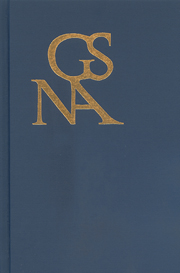Book contents
- Frontmatter
- Contents
- Special Section on Goethe's Lyric Poetry
- Introduction: New Approaches to Goethe's Lyric Poetry
- Intimacy, Morality, and the Inner Problematic of the Lyric
- Beyond the Poem: Strategies of Metapoetic Reflection in Goethe's Erster Weimarer Gedichtsammlung
- Meistersänger als Beruf: The Maieutics of Poetic Vocation in “Erklärung eines alten Holzschnittes …”
- Song or Narration?: Goethe's Mignon
- The Sucking Subject: Structural Ambiguities of Goethe's “Auf dem See” in Literary and Linguistic Perspective
- “Höhere Begattung,” “höhere Schönheit”: Goethe's Homoerotic Poem “Selige Sehnsucht”
- Poetry after Faust
- Forms of Knowledge/Knowledge of Forms: The Epistemology of Goethe's West-östlicher Divan and Cavellian Skepticism
- Im flüßgen Element bin und wieder schweifen: Development and Return in Goethe's Poetry and Hegel's Philosophy
- Goethe's Historical Particularism and the “Right Hand” of History: Early Modern State Building, Nobility, and the Feud in Götz von Berlichingen
- Where Are the Mountains?: Johann Jacob Bodmer and the “Pre-Kantian Sublime”
- The Politics of Aesthetic Humanism: Schiller's German Idea of Freedom
- Romanticism's Old German as Stepping-Stone to Goethe's World Literature
- Book Reviews
The Politics of Aesthetic Humanism: Schiller's German Idea of Freedom
from Special Section on Goethe's Lyric Poetry
Published online by Cambridge University Press: 05 October 2013
- Frontmatter
- Contents
- Special Section on Goethe's Lyric Poetry
- Introduction: New Approaches to Goethe's Lyric Poetry
- Intimacy, Morality, and the Inner Problematic of the Lyric
- Beyond the Poem: Strategies of Metapoetic Reflection in Goethe's Erster Weimarer Gedichtsammlung
- Meistersänger als Beruf: The Maieutics of Poetic Vocation in “Erklärung eines alten Holzschnittes …”
- Song or Narration?: Goethe's Mignon
- The Sucking Subject: Structural Ambiguities of Goethe's “Auf dem See” in Literary and Linguistic Perspective
- “Höhere Begattung,” “höhere Schönheit”: Goethe's Homoerotic Poem “Selige Sehnsucht”
- Poetry after Faust
- Forms of Knowledge/Knowledge of Forms: The Epistemology of Goethe's West-östlicher Divan and Cavellian Skepticism
- Im flüßgen Element bin und wieder schweifen: Development and Return in Goethe's Poetry and Hegel's Philosophy
- Goethe's Historical Particularism and the “Right Hand” of History: Early Modern State Building, Nobility, and the Feud in Götz von Berlichingen
- Where Are the Mountains?: Johann Jacob Bodmer and the “Pre-Kantian Sublime”
- The Politics of Aesthetic Humanism: Schiller's German Idea of Freedom
- Romanticism's Old German as Stepping-Stone to Goethe's World Literature
- Book Reviews
Summary
Die deutsche Freiheit ist in der Tat etwas anderes als die westliche, als die englische und französische.
—Ernst Troeltsch, “Die deutsche Idee von der Freiheit” (1916)The memorials of 2005 and 2009 to Friedrich Schiller invited broader assessments of his achievements and historical legacy, reminding us of his significance in modern cultural history. Celebrated in Germany as a poet, dramatist, and philosopher, whose voice, surprisingly, once again resonated with the spiritual needs of the times, Schiller is today recognized in an international academic context primarily for his theoretical work. Here his aesthetic theories are regarded as the “fountainhead of all later German critical theory” and as an inspiration for the “whole radical aesthetic tradition from Coleridge to Herbert Marcuse.” As such, Schiller's aesthetics has played a significant role in recent Anglo-American confrontations between “humanists and theorists” as well as in ongoing debates over “aesthetics and politics.” Yet despite such continued visibility and attention, Leslie Sharpe's observations certainly hold true that “on many major issues in Schiller's aesthetics, opinion is as divided as ever.” Notwithstanding its “enormous impact and continuing resonance in cultural debates,… many bones of critical contention remain.” This is nowhere more apparent than when larger ideological, or political, implications of Schiller's theoretical work are at issue. In spite of a thriving industry of Schiller exegesis, which ever since its “Postwar Boom” has shown no signs of exhaustion, one still observes widespread disagreement over the actual nature of his political ideals and legacy.
- Type
- Chapter
- Information
- Goethe Yearbook 20 , pp. 223 - 246Publisher: Boydell & BrewerPrint publication year: 2013



